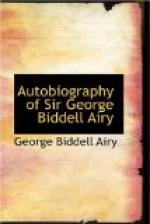on July 21st by a letter in the Athenaeum addressed
to Sir Robert Inglis, in terms so strong and so well
supported that Sir James South was effectually silenced.”
The following extract from a letter of Airy’s
to the Earl of Rosse, dated Dec. 15th 1846, will shew
how pronounced the quarrel between Airy and South
had become in consequence of the above-mentioned attack
and previous differences: “After the public
exposure which his conduct in the last summer compelled
me to make, I certainly cannot meet him on equal terms,
and desire not to meet him at all.” (Ed.).—“In
the Mag. and Met. Department, I was constantly
engaged with Mr Charles Brooke in the preparation
and mounting of the self-registering instruments,
and the chemical arrangements for their use, to the
end of the year. With Mr Ronalds I was similarly
engaged: but I had the greatest difficulty in
transacting business with him, from his unpractical
habits.—The equipment of the Liverpool Observatory,
under me, was still going on: I introduced the
use of Siemens’s Chronometric Governor for giving
horary motion to an Equatoreal there. I have since
introduced the same principle in the Chronograph Barrel
and the Great Equatoreal at Greenwich: I consider
it important.—On Feb. 13th I received the
Astronomical Society’s Medal for the Planetary
Reductions.—In the University of London:
At this time seriously began the discussion whether
there should be a compulsory examination in matters
bearing on religious subjects. After this there
was no peace.—For discovery of Comets three
medals were awarded by Schumacher and me: one
to Peters, two to De Vico. A comet was seen by
Hind, and by no other observer: after correspondence,
principally in 1848, the medal was refused to him.—With
respect to the Railway Gauge Commission: On Jan.
1st, in our experiments near York, the engine ran
off the rails. On Jan. 29th the Commissioners
signed the Report, and the business was concluded
by the end of April. Our recommendation was that
the narrow gauge should be carried throughout.
This was opposed most violently by partisans of the
broad gauge, and they had sufficient influence in
Parliament to prevent our recommendation from being
carried into effect. But the policy, even of the
Great Western Railway (in which the broad gauge originated),
has supported our views: the narrow gauge has
been gradually substituted for the broad: and
the broad now (1872) scarcely exists.—On
June 20th Lord Canning enquired of me about makers
for the clock in the Clock Tower of Westminster Palace.
I suggested Vulliamy, Dent, Whitehurst; and made other
suggestions: I had some correspondence with E.
B. Denison, about clocks.—I had much correspondence
with Stephenson about the Tubular Bridge over the
Menai Straits. Stephenson afterwards spoke of
my assistance as having much supported him in this
anxious work: on Dec. 11th I was requested to
make a Report, and to charge a fee as a Civil Engineer;
but I declined to do so. In January I went, with
George Arthur Biddell, to Portsmouth, to examine Lord
Dundonald’s rotary engine as mounted in the
‘Janus,’ and made a Report on the same
to the Admiralty: and I made several subsequent
Reports on the same matter. The scheme was abandoned
in the course of next year; the real cause of failure,
as I believe, was in the bad mounting in the ship.




